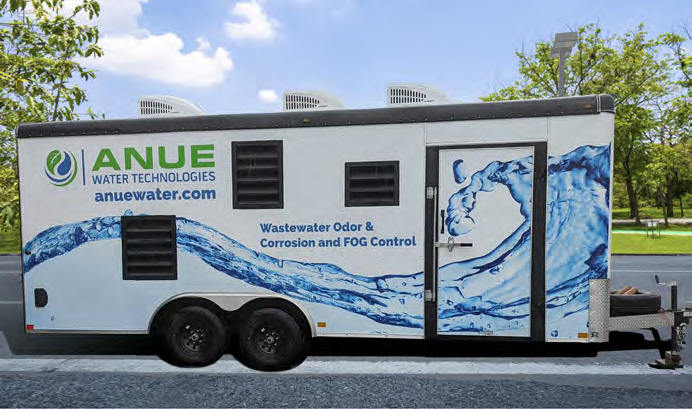By Greg Bock, Anue Water Technologies VP General Manager
The cause of odors from wastewater control lift stations is a combination of many substances being washed down the sewer collection system. From home and restaurant grease to commercial and industrial solvents, wastewater lift stations accumulate an enormous amount of sludge As various parts of a collection system have different sources of sewage and detention times, it is difficult to control odors at the source. This means they must be dealt with at the lift station.
Wastewater Odor Control
A lift station can have both a grease layer, which could lead to an oxygen-depleted or anaerobic condition. Plus, it could have additional issues with hydrogen sulfide either in the liquid or vapor phase. The smell is unmissable and overwhelming at times. This rotten egg smell is a warning to stay clear and stand back.
Hydrogen sulfide (H2S) is a colorless poisonous gas that results from anaerobic conditions. Exposure can be as simple as the horrible rotten egg smell, which can cause mild symptoms such as watery eyes, slight difficulty breathing, and skin irritation.
Higher H2S values, which typically cannot be detected by the sense of smell, can lead to headaches, dizziness, unconsciousness, and even death with prolonged exposure time. Safety should always be paramount when it comes to collection lines and wastewater control lift stations.
Hydrogen sulfide gas can also be very corrosive and damaging to the internals of the lift station and its surrounding electrical control panel systems. As it comes into contact with water, either in the lift station head space or simply with moisture in the air in the wastewater lift station equipment, H2S will form sulfuric acid.
This can wreak havoc on the operation of lift station pumps, potentially resulting in costly downtime, service needs, and overflows from defective level controls or damaged variable frequency drive equipment.
Sewage Lift Stations (Odor Control Systems)
How do we deal with the fats, oil, and grease, and the depletion of oxygen along with the hydrogen sulfide safety concerns and corrosive environment? The best solution would be to have residents, restaurants, commercial, and industrial users be more cognizant of what is being sent to the collection lines and lift stations. Even more important, monitoring of pump stations should occur daily. Although, the reality is that it needs to be addressed at the collection site for point source odour control.
We know that a grease cap can reduce the amount of oxygen available to the waste stream and that H2S is generated by septic conditions. Therefore, it makes sense to break up the grease and add oxygen to the lift station. There are several products on the market that will either break up a grease cap or remove hydrogen sulfide gas in the air space. However, Anue Water Technologies has a system that will break up the grease cap, oxidize water-based sulfides and leave a residual layer of ozone in the air space addressing hydrogen sulfide gas in the air.
Anue’s Phantom System for Wastewater Control Lift Stations
The company’s Phantom® ozone and oxygen generation system circulates wastewater in the lift station water. It uses a dedicated grinder or chopper pump through a venturi while injecting highly concentrated oxygen and ozone directly into the stream.
Ozone that is injected into the recirculated 150 lpm wastewater stream will oxidize the existing aqueous sulfides, along with organic compounds. As the water is sprayed on the surface of the lift station water, any grease cap is broken up and remains homogenized, allowing the surface water to be broken up. Additional free oxygen is introduced to the system, making for a grease and hydrogen sulfide-free environment.
The ability to provide a wastewater treatment plant environment that is free of a grease cap and minimal hydrogen sulfide generation reduces the amount of service and maintenance required. This allows operations teams to focus on other areas of the sewer system, saving time, power, and money, while protecting the environment.
Contact Anue today to get started on wastewater odor control for your business or organization. We look forward to keeping your staff, community, and surrounding environment clean and breathable.




